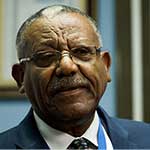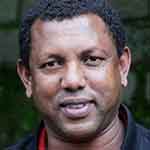
In-Picture | Aug 03,2025
Feb 13 , 2021
By Christian Tesfaye
The political history of the Horn of Africa is depressing to say the least. Only in such a region – except for the Middle East – could Ethiopia seem rule-based, stable and even prosperous.
Each country has a depressing era of history and contemporary politics. Take Eritrea, a country with a tiny population. Highly militarised, economically poor and politically secretive, it fought its war with Ethiopia about half a decade after it gained its independence. It never regained its footing afterwards. There were border issues with Djibouti after the war ended with Ethiopia, and by the late 2000s the country had been saddled with sanctions that left its economy in tatters. The country eventually clawed its way out of its pariah status after a rapprochement with its southern neighbour only to face criticism for inviting itself into a conflict in Ethiopia’s northern region.
At least Eritrea has stability and a strong central government going for it. The same cannot be said for Somalia, a country that has been ungovernable since the early 1990s. It was once cohesive enough to mobilise resources and invade the eastern part of Ethiopia. Today, Somaliland has declared itself an independent state, with few countries recognising its status, while al-Shabab, a fundamentalist group, poses a threat to Somalia's UN-recognised government.
Djibouti is more stable and open. Like Ethiopia, compared to its neighbours, it appears tolerable. Sure it is saddled with debt, suffers from ethnic rivalries and has had just two presidents since its independence from France in 1977. Today, it leases its ports as a military hub for some of the world’s major powers, including the United States and China.
It is then no wonder that such a collection of countries have over the years clashed with one another, turning the region into one of the most conflict-prone. The worst offenders here are perhaps Ethiopia and Eritrea, who fought a two-year war at the turn of the millennium that would go on to take the lives of tens of thousands of people. In their drive for regional hegemony, they have raced to the bottom, trying to gain allies to their side and punish detractors.
There was a rapprochement in 2018, winning Prime Minister Abiy Ahmed (PhD) a Nobel Peace Prize. But the details of these peace terms remain shrouded in mystery and has yet to be institutionalised. With observers, some Ethiopian officials and US diplomats saying that Eritrea has taken part in the armed conflict in the northern region of the country – though denied insistently by both Asmera and Addis Abeba – it is not clear what the road ahead will be.
Ethiopia has also fought wars with Sudan and is currently in a border dispute with the country over an area known as al-Fashaga. Eritrea, in fact, broke relations with Sudan just a year after independence. For years afterward, they had accused one another of supporting anti-government forces, though there has been a thawing of relations over the past decade.
Neither are Eritrea, Djibouti and Somalia best of friends. The first two had a border conflict that saw dozens die. It was also for alleged support of extremist groups in Somalia that the UN sanctioned Eritrea, though conclusive evidence of direct support was never found and the sanction was subsequently lifted.
I can go on and on, but the picture is clear. It is one of instability, poverty, hunger and deprivation. For the foreseeable future as well, it seems that it will continue to be the case. Governments insecure with their power would continue to seek outside distraction, not to mention fail to develop the mechanisms to address regional issues with tact and dexterity.
PUBLISHED ON
Feb 13,2021 [ VOL
21 , NO
1085]


In-Picture | Aug 03,2025

In-Picture | Jul 20,2025

Viewpoints | Oct 03,2020

My Opinion | Aug 29,2020

Radar | Jun 18,2022

Viewpoints | Aug 16,2020

My Opinion | Dec 29,2018

Life Matters | Jan 23,2021

Verbatim | Jul 27,2019

Verbatim | Jul 13,2019

Photo Gallery | 178146 Views | May 06,2019

Photo Gallery | 168355 Views | Apr 26,2019

Photo Gallery | 159125 Views | Oct 06,2021

My Opinion | 137050 Views | Aug 14,2021
Commentaries | Oct 25,2025

Dec 22 , 2024 . By TIZITA SHEWAFERAW
Charged with transforming colossal state-owned enterprises into modern and competitiv...

Aug 18 , 2024 . By AKSAH ITALO
Although predictable Yonas Zerihun's job in the ride-hailing service is not immune to...

Jul 28 , 2024 . By TIZITA SHEWAFERAW
Unhabitual, perhaps too many, Samuel Gebreyohannes, 38, used to occasionally enjoy a couple of beers at breakfast. However, he recently swit...

Jul 13 , 2024 . By AKSAH ITALO
Investors who rely on tractors, trucks, and field vehicles for commuting, transporting commodities, and f...

Oct 25 , 2025
The regulatory machinery is on overdrive. In only two years, no fewer than 35 new pro...

Oct 18 , 2025
The political establishment, notably the ruling party and its top brass, has become p...

Oct 11 , 2025
Ladislas Farago, a roving Associated Press (AP) correspondent, arrived in Ethiopia in...

Oct 4 , 2025
Eyob Tekalegn (PhD) had been in the Governor's chair for only weeks when, on Septembe...

Oct 25 , 2025 . By YITBAREK GETACHEW
Officials of the Addis Abeba's Education Bureau have embarked on an ambitious experim...

Oct 26 , 2025 . By YITBAREK GETACHEW
The federal government is making a landmark shift in its investment incentive regime...

Oct 27 , 2025
The National Bank of Ethiopia (NBE) is preparing to issue a directive that will funda...

Oct 26 , 2025 . By SURAFEL MULUGETA
A community of booksellers shadowing the Ethiopian National Theatre has been jolted b...